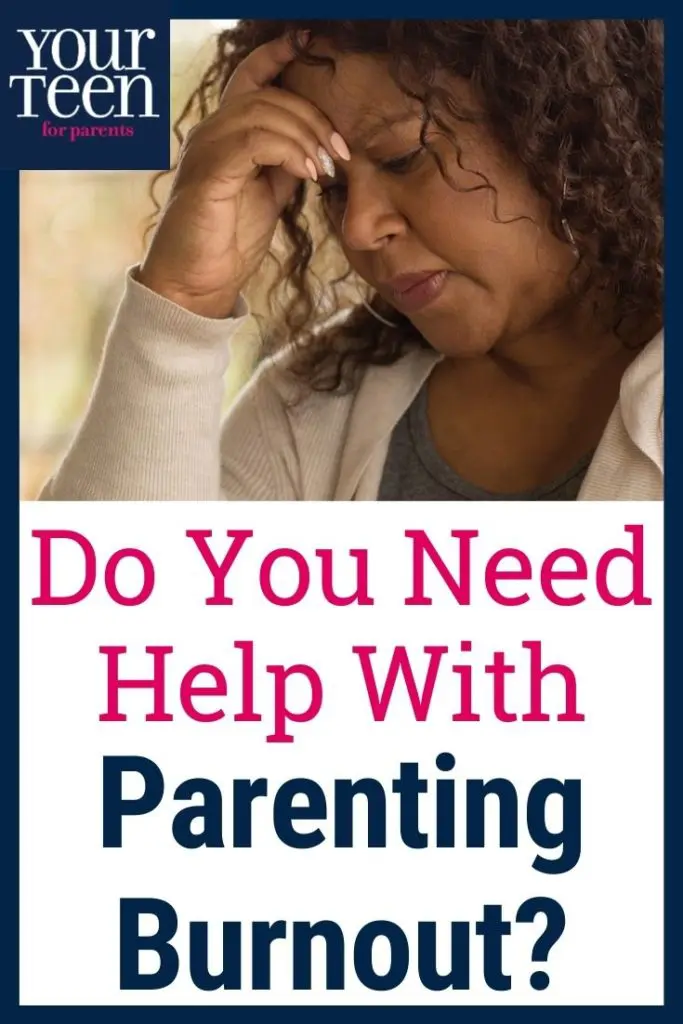Jennifer first noticed feeling burned out when her daughter hit puberty. She said she felt “emotionally and physically drained and absolutely failing as a parent in every way.” At her worst, she remembers thinking, “I’m doing it all here, giving it my all. Why isn’t everything perfect here?” Her feelings of being overwhelmed became so severe that she met with a therapist to talk about her parenting exhaustion.

“I see parenting burnout more with parents of teenagers than with parents of toddlers. When you are a new parent, it’s early in your parenthood so you still feel like you are learning things,” says Dr. Sheryl Ziegler, psychologist and author of Mommy Burnout. “It’s not burnout until you feel like, ‘I’ve been doing this over and over, and I keep getting the same results.’ Parents think, ‘I’m ineffective, they don’t listen to me, and I’ve lost myself.’”
After this last year, that parenting burnout can feel even more intense. In addition to worrying about their family’s health, many parents have been trying to work from home while also providing assistance to kids learning remotely. Plus, being cooped up without the release of socializing with others outside the family can add to the overwhelm.
The years of parenting older kids can be some of the most stressful. A research study published in Developmental Psychology found that mothers of middle-school age children reported the highest levels of emptiness and lowest levels of life satisfaction compared to moms of other age groups. And parenting burnout can be serious. A recent research study in Clinical Psychological Science found that parental burnout—characterized by overwhelming parenting exhaustion, emotional distancing from children, and a sense of parental ineffectiveness—is strongly associated with neglectful and violent behaviors towards children.
How to Overcome Burnout: Help for Overwhelmed Mothers
Here are some ways to help parents who are struggling with parenting exhaustion:
Spend time with friends
“My number-one tip to overcome parent burnout is connecting with friends,” says Ziegler. “That is something that often goes by the wayside when parents are struggling. When you are working and raising children, you feel like there is no time.”
Ziegler explains that many parents don’t realize how important friendships are to their emotional health. Research shows that spending time with friends triggers the release of the feel-good hormone oxytocin, Ziegler says. Friends can also provide a support system by listening, providing helpful feedback, or commiserating about the challenges of parenting and feelings or parenting burnout.
Social distancing rules may make it difficult to get together in person, but FaceTime, Zoom, or even an old fashioned phone call can still help.
Focus on what works best for your family
Ziegler explains that some people think more options are better. So parents spend hours researching the best choices for their kids. But she has found that more options can lead to parenting burnout and exhaustion.
“Whatever a parent picks, they feel like maybe the other option would have been better,” says Ziegler. “They can also get paralyzed in fear. Then they either don’t make a decision or make a poor decision based out of fear.”
She recommends prioritizing what is necessary by differentiating between wants and needs. She suggests shifting your mind-set from “the best” to “what works.” That’s especially important as the pandemic presents less-than-ideal choices for schooling and other aspects of everyday life.
Focus on doing just one thing at a time
If you have to work from home and homeschool your child you may be tempted to multitask, but try to avoid it to the extent you can.
Dr. Carla Naumburg, a clinical social worker and author of parenting books including How To Stop Losing Your Sh*t With Your Kids stresses the importance of avoiding multitasking: The more balls you have in the air, the more likely you will drop one. “Multitasking is a primary driver of burnout,” says Naumburg. Instead, she suggests that you accept that you will not get everything done. Instead, encourage your kids to help with chores to avoid feeling overwhelmed.
Let go of your kids’ happiness
Naumburg explains that taking responsibility for someone else’s emotions is an unwinnable challenge, and it will wear you out. “Emotions aren’t something we can create or control,” she says. “Rather, they’re something we experience. Sometimes it’s because of the choices we make, or what happens to us, or for no clear reason at all.”
Our society’s obsession with happiness, aided by researchers, clinicians, social media, and advertisers leads us to believe that “if we’re not happy, we must be doing something wrong,” says Naumburg. And focusing on our kids’ happiness, like helicoptering and other hypervigilant parenting behaviors, can make parents feel burned out.
In addition to it being exhausting for parents, she says that when parents hyperfocus on their children’s happiness, kids learn—often inadvertently—that it’s not okay to be unhappy, and that’s confusing. “We’re missing out on an opportunity to teach our kids and ourselves how to deal with unpleasant or uncomfortable emotions,” says Dr. Naumburg.
If necessary, seek counseling
“My therapist was incredibly helpful in guiding me and my husband as a parenting team to help get my kid through their issue and in getting our family back on track,” says Jennifer. “Thanks to my therapist, I’m able manage the stress and get through it on my own in healthy ways.”

Jennifer explains that because she went to counseling her family is happier and healthier. She also feels that she is better equipped to help her children manage their own stress and be a role model for them.





